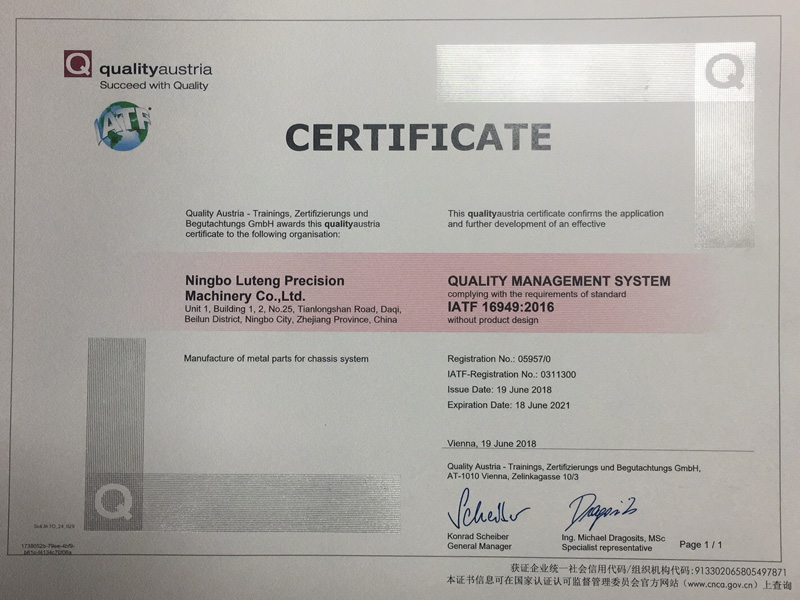And we also have IATF-16949 certificate and be able to get more certificates in near future.
Our company culture is to be customers’audient and a fighter in Industry .
IATF16949:2016 Quality Management System certified
Certificates are very important for manufacturing company, so update IATF to the latest version is a priority in company schedule.
In last week, ningbo luteng has got new version of IATF16949 certificates.
As a most important certificate in auto parts industry, updated 16949 will give us a strong support for cooperation within automobile industry. And we will continue to offer best products to all customers all around the world.

Introduction to IATF 16949
IATF 16949: 2016 (replaces ISO/TS 16949: 2009) is a standard that establishes the requirements for a Quality Management System (QMS), specifically for the automotive sector. The ISO/TS 16949 was originally created in 1999 to harmonize different assessment and certification schemes worldwide in the supply chain for the automotive sector.
The primary focus of the IATF 16949 standard is the development of a Quality Management System that provides for continual improvement, emphasizing defect prevention and the reduction of variation and waste in the supply chain. The standard, combined with applicable Customer-Specific Requirements (CSR’s), define the QMS requirements for automotive production, service and/or accessory parts.
IATF 16949:2016 is an independent QMS standard that is fully aligned with the structure and requirements of ISO 9001:2015. Therefore, the IATF 16949 cannot be implemented alone as a stand-alone document, but must be implemented as a supplement and in conjunction with ISO 9001:2015.
After October 01, 2017, audits cannot be conducted to ISO/TS 16949 and organizations must transition to the new IATF 16949 in line with their current audit cycle, according to the allowable timing requirements. Failure to conduct the audit within the allowable timing requirements requires the organization to start over with an initial certification audit. The transition audit shall be the duration of a recertification audit plus additional time for a documentation review. All supporting functions on site or at a remote location shall be included in the transition process.
A Quality Management System based on IATF 16949:
● Is a method of defining how an organization can meet the requirements of its customers and other stakeholders
● Promotes the idea of continual improvement
● Requires organizations to define objectives and continually improve their processes in order to reach them
● Emphasizes defect prevention
● Includes specific requirements and core tools from the automotive industry
● Advanced Product Quality Planning (APQP)
● Failure Mode and Effects Analysis (FMEA)
● Statistical Process Control (SPC)
● Measurement Systems Analysis (MSA)
● Production Part Approval Process (PPAP)
● Promotes reduction of variation and waste in the supply chain
● Requires documented and implemented corporate responsibility polices
What is IATF 16949
The IATF 16949 standard provides guidance and tools for companies and organizations who want to ensure that their products consistently meet customer requirements and that quality and customer satisfaction are consistently improved. Requirements for certification to IATF 16949 are defined in the 2016 Revision 5 of the rules for achieving and maintaining IATF recognition.
The IATF 16949 standard is a supplemental standard and is used in conjunction with the ISO standards:
● IATF 16949 – establishes the Automotive supplemental requirements of a quality management system
● ISO 9001 – defines the base requirements of a quality management system
● ISO 9000 – covers the basic concepts and language
● 9004 – focuses on how to make a quality management system more efficient and effective
● ISO 19011 – provides guidance on internal (1st party) and external (2nd party) audits of quality management systems
● ISO 31000 – outlines risk management principles and guidelines
IATF 16949 defines the criteria for an automotive-based QMS with the goal to become 3rd party registered. It can be used by any supplier, large or small, and should be applied throughout the automotive supply chain. In fact, there over 65,000 suppliers worldwide which are currently certified to ISO/TS 16949. All requirements of IATF 16949 are applicable unless suppliers do not provide product design related functions. Requirements are generic and are intended to be applicable to any supplier providing design and development, production and, when relevant, assembly, installation and services of automotive related products, including products with embedded software. The IATF 16949 standard is applicable to sites of the organization where manufacturing of customer-specified production parts, service parts, and/or accessory parts occur.
The standard is based on seven Quality Management Principles, including a strong customer focus, the motivation and implication of top management, the process approach and continual improvement.
These Quality Management Principles are defined as follows:
1. Customer focus
2. Leadership
3. Engagement of people
4. Process approach
5. Improvement
6. Evidence-based decision making
7. Relationship management
Copyright © Ningbo Luteng Precision Machinery Co.,Ltd | All Rights Reserved